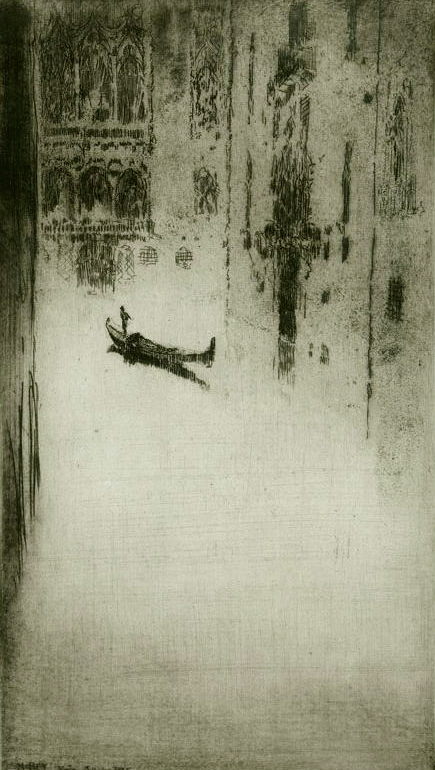Barcarolle. 1926. Etching. Carter 233. 14 7/8 x 8 3/8 (sheet 17 1/4 x 10 1/4). Edition 80, #xxv. Print Collector's Quarterly 24 (1938): 428; Eric Denker, Reflections & Undercurrents: Ernest Roth and Printmaking in Venice, 1900-1940, p. 98. An extremely rich impression with subtle tonal wiping, printed on pale blue-toned laid paper from an antique volume. Signed and numbered in ink. Housed in an archival French mat and a 20 3/4 x 14 3/4-inch gold leaf frame.
This is one of McBey's most famous Venetian subjects. Carter writes, "On a moonlit night, a gondola glides around the curve of a canal between palaces. The gondolier sings his barcarolle."
![]()
Born in Newburgh near Aberdeen, James McBey attended evening classes at Graydon's School of Art and taught himself etching, building his own press at the age of fifteen. He moved to London to prepare for a one-man show at Goupil's Gallery, and shortly after this highly successful first show, he traveled to Morocco with James Kerr Lawson, beginning a long association with North Africa.
McBey enlisted in the military in 1916. His pictures of the Somme led to his appointment as an Official War Artist. In 1917 he was sent to Egypt where he completed some 300 watercolors of the campaign in Egypt and Palestine. v McBey visited America in 1929, where he met Marguerite Loeb in Philadelphia. The two married in 1930 and, together, they settled in the region of North Africa, buying a house in Tangier and another in Marrakesh. McBey lived in America during World War II and was even able to find some work, but in 1946 they returned to Tangier where McBey continued to work until his death in 1959.
His etchings are varied in subject, but all show his excellent draughtmanship and his sense of light. He was particularly good at depicting the North African desert, water scenes and cities such as New York, Venice, and Rotterdam.



